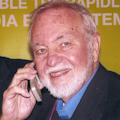When you're on the road, think twice before you make or take that call. Already, 43 states restrict the use of cell phones while driving. Over 90% of Europe and dozens of other countries have even more severe restrictions, including complete bans on vehicular cell-phone use. The booming hands-free accessory market, then, isn't surprising.
Many special hands-free products are superior to existing Bluetooth headsets and wired ear-buds. They feature mounting hardware for the handset, power from the lighter jack, and a separate speaker and microphone. Yet these hands-free kits present unique design problems. Texas Instruments' Hands-Free Kit (HFK) Development Platform addresses such issues. The development platform provides a way for developers to get higher-quality audio products to market faster with lower costs.
A reference design and a development system back up the kit. TI's TMS320C-5407 DSP chip and the Taiyo Yuden Bluetooth module lie at the heart of the design (see the figure). The 120-MHz DSP features up to 4 Mbytes of flash and up to 512 kbytes of SRAM, plus a customizable programmable logic device. With 50% headroom on the DSP, designers can add a wide range of differentiating features, such as an LCD display, advanced speech processing algorithms, or any other functionality. Voice filtering and processing for echo cancellation, noise reduction, and high-quality audio also are included.
The codec is used in connection with TI's AIC24 dual voice codec for audio input and output. It can accept three microphone inputs for convenience or diversity. A speaker or an external FM transmitter that uses the car's FM radio can serve as the output. Also, the codec features two 16-bit analog-to-digital converters (ADCs) and two 16-bit digital-to-analog converters (DACs). Both use oversampling sigma-delta technology with a programmable sampling rate.
The Taiyo Yuden Bluetooth module features TI's BRF6100 single-chip CMOS Bluetooth radio. Fully certified by the Bluetooth special interest group, the module eliminates the need to know anything about RF design. Included in the module is Stone Street's Bluetopia stack with headset and hands-free profiles. A 1149.1 JTAG emulation connector is incorporated for testing. All circuitry operates from a 12-V dc source. Several power-management and regulator chips handle the various power needs.
The Texas Instruments development board contains the TMS320C5407 DSP chip with all support circuitry. Inside is Clarity Technologies' Clear Voice Capture acoustic echo-cancellation and noise-reduction software. Also provided are three user-programmable LEDs and three pushbuttons. The DSP is user-customizable thanks to TI's Code Composer Studio development software. Voice recognition is one potential custom feature.
The development package, which includes a DSP motherboard and Bluetooth daughtercard, is available now with full software and documentation for $1495.
Texas Instruments Inc.(800) 477-8924, ext. 5800www.ti.com/hfknr
About the Author

Louis E. Frenzel
Click here to find more of Lou's articles on Electronic Design.